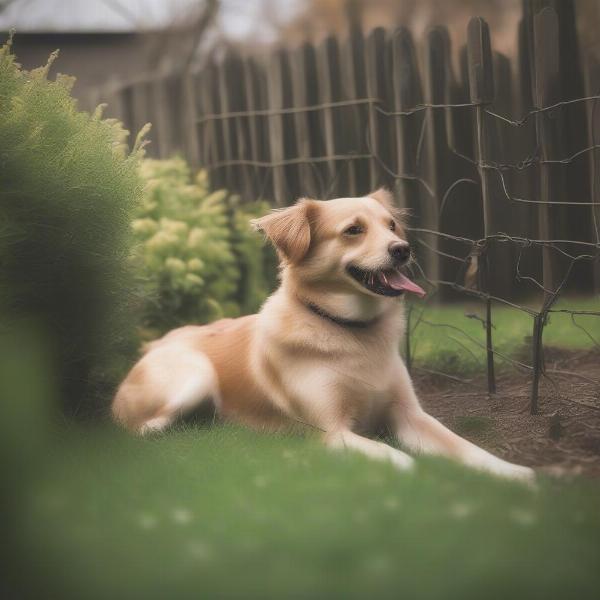Poppies, with their vibrant blooms, are a common sight in gardens and fields. But are poppies toxic to dogs? The answer, unfortunately, is yes. While not all poppy species are equally dangerous, several varieties, especially the opium poppy (Papaver somniferum), pose a significant threat to our canine companions. Understanding the risks associated with poppies is crucial for responsible dog ownership.
Understanding Poppy Toxicity in Dogs
The toxicity of poppies comes from the alkaloids they contain, particularly morphine, codeine, and thebaine. These alkaloids are concentrated in the sap, seeds, and seed pods of the poppy plant. When ingested by dogs, these substances can cause a range of symptoms, from mild to severe, and in some cases, can even be fatal. The severity of the reaction depends on the type of poppy, the amount ingested, and the individual dog’s size and sensitivity.
Different poppy species contain varying levels of these toxic alkaloids. The opium poppy, the source of opium and other narcotics, is the most dangerous. Other ornamental poppy varieties, such as the California poppy (Eschscholzia californica), are less toxic but can still cause gastrointestinal upset if consumed in large quantities.
Symptoms of Poppy Poisoning in Dogs
Recognizing the signs of poppy poisoning is crucial for timely intervention. Symptoms can manifest within minutes to hours after ingestion and can include:
- Lethargy and drowsiness
- Difficulty breathing
- Slowed heart rate
- Constricted pupils (pinpoint pupils)
- Loss of coordination
- Vomiting and diarrhea
- Seizures
- Coma
If you suspect your dog has ingested any part of a poppy plant, it’s vital to seek immediate veterinary attention.
What to Do If Your Dog Eats a Poppy
If your dog ingests a poppy, do not wait to see if symptoms develop. Time is of the essence. Contact your veterinarian or an emergency animal hospital immediately. If possible, bring a sample of the poppy plant your dog ingested to aid in diagnosis and treatment. The veterinarian may induce vomiting or administer activated charcoal to absorb the toxins. Supportive care, such as intravenous fluids and oxygen therapy, may also be necessary.
“Early intervention is key in cases of poppy poisoning,” says Dr. Emily Carter, DVM, a veterinary toxicologist. “The sooner treatment is initiated, the better the chances of a full recovery.”
Preventing Poppy Exposure
Prevention is the best approach when it comes to poppy toxicity in dogs. If you have poppies in your garden, ensure they are inaccessible to your dog. Fence off areas where poppies are planted or grow them in containers out of reach. When walking your dog, be vigilant and steer them away from areas where wild poppies might be growing. Educating yourself and your family about the potential dangers of poppies can help protect your furry friend.
 Dog in a Safe Garden
Dog in a Safe Garden
Conclusion
While poppies can add beauty to our surroundings, they pose a real danger to dogs. Understanding the toxicity of poppies, recognizing the symptoms of poisoning, and taking preventative measures are crucial steps in safeguarding our canine companions. By being informed and proactive, we can ensure our dogs enjoy a healthy and safe environment. Are poppies toxic to dogs? Yes, they are, and it’s our responsibility as pet owners to protect them from this potential hazard.
FAQ
- Are all poppies toxic to dogs? While the opium poppy is the most dangerous, other varieties can also cause gastrointestinal upset. It’s best to keep all poppies away from dogs.
- What part of the poppy is most toxic? The sap, seeds, and seed pods contain the highest concentration of toxic alkaloids.
- How long does it take for poppy poisoning symptoms to appear? Symptoms can appear within minutes to hours after ingestion.
- What should I do if my dog eats a poppy? Contact your veterinarian or an emergency animal hospital immediately.
- Can poppy poisoning be fatal to dogs? Yes, in severe cases, poppy poisoning can be fatal.
Related Articles:
(No related articles found)
About ILM Dog
ILM Dog (ilmdog.com) is your trusted source for expert advice on dog care, breed selection, health, training, nutrition, grooming, and more. We offer valuable, practical information for dog owners of all experience levels, from puppy care to senior dog care, helping you navigate every stage of your dog’s life. We also provide insightful guides on dog products and accessories to enhance your furry friend’s well-being. Contact us for expert advice and support: Email: [email protected], Phone: +44 20-3965-8624.